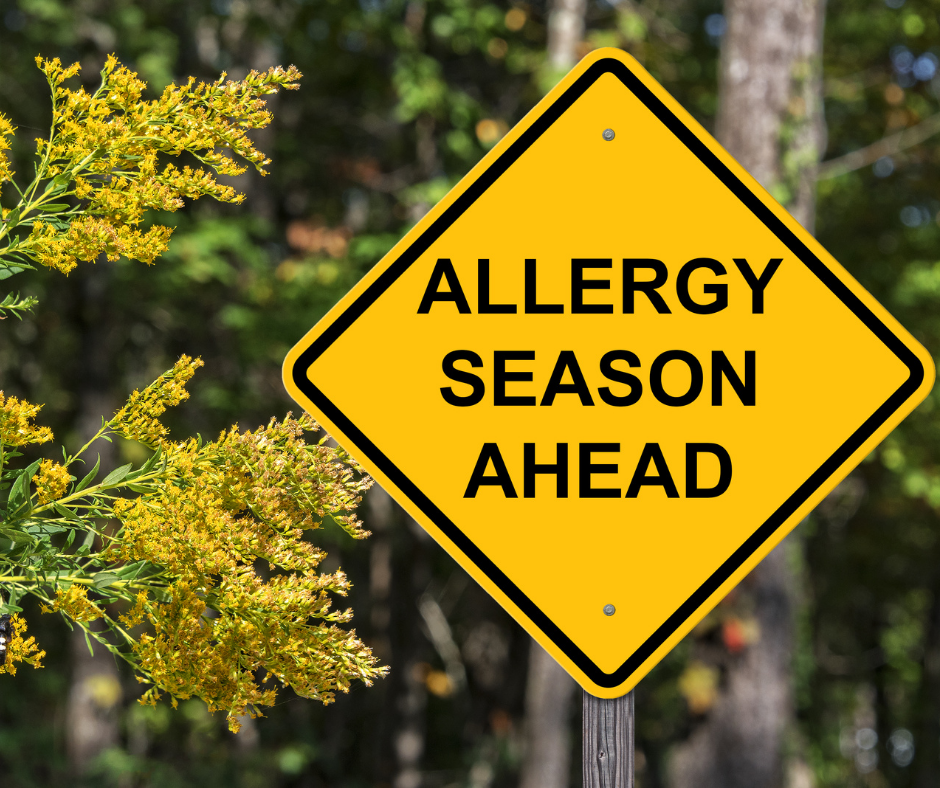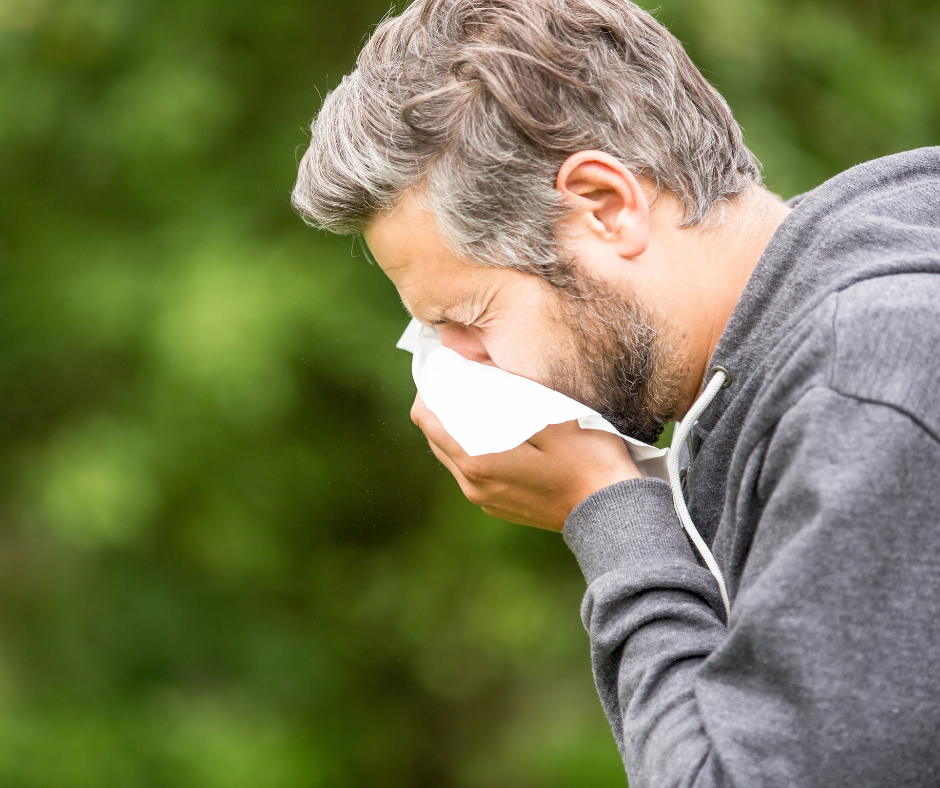By Claire Bacon, ACN, CNC
When seasonal allergies strike, they bring a variety of symptoms. These could include itchy and watery eyes, sneezing, runny nose, and/or sore throat. Many people look to the upcoming Spring as a season of taking over-the-counter drugs. It doesn’t have to be that way! Even though you may feel better temporarily, medicating with anti-histamines isn’t a healthy or sustainable option. Doing so gradually weakens the liver by stopping histamine function, and lowers immune resilience in the long term. Instead, consider using a variety of daily natural therapies (including vitamin D) that support how the body responds to seasonal allergies. You can work on getting your body ready NOW so you’ll have less symptoms LATER.
We have so many suggestions for you during allergy season, that you can choose a variety of ways to support your body and see which combination works best. Today and in the coming weeks, we’ll cover many great things to help. These small changes can add up over time to bring you lasting relief!

What is this Allergic Response?
“Allergy” refers to any condition in which the body mounts an attack on a specific substance that doesn’t do the same for everyone. People can experience allergic reactions to foods, chemicals, plants, animals, dust, or a variety of tree and grass pollens.
An allergy is a normal immune response gone into overdrive. An invader of some kind enters the body, and the body has an inflammatory reaction—often consisting of excess mucus forming at the site of invasion. Usually this healthy and normal reaction rids the body of the threat. What is not normal is when the body escalates this response against something that is not in fact a threat to the body. We should be able to live in harmony with our surroundings.
A generally weakened immune system provides an environment for allergies to develop. The body considers itself vulnerable to attack, and prepares to launch a defense against any perceived invader at a moment’s notice. Pollen, cat hair and dust are not truly invaders and are tolerated just fine by most people. This hair-trigger response is the body’s way of averting a crisis in the long run. Therefore, the key to making yourself more resilient lies in building up your immune system.

Vitamin D and Seasonal Allergies
Did you know, vitamin D can help reduce the severity of your allergic responses. Vitamin D has beneficial effects on lung development and the immune system, which means positive effects on allergen-induced inflammatory pathways. In other words, a lack of vitamin D could lead to an exaggerated response when combating pollen. An early correction of vitamin D deficiency can promote mucosal defense, helping your body function better. The goal is to remove the allergen from the body without causing symptoms.
There are vitamin D receptors in nearly all the cells that make up the immune system. For your immune system to work properly vitamin D is critical. With vitamin D you are not “boosting” your immune system (the immune system is already overactive with allergies). Rather, you’re helping to regulate or normalize it to work as it should. With vitamin D, the mucosal cells become more efficient and better able to recognize what is actually a threat vs. what is harmless.
Some studies suggest a link between vitamin D deficiency and the development of asthma and allergies. The severity of vitamin D deficiency is generally associated with more inflammatory markers in allergic and asthmatic children, compared to controls.
This time of year, everyone is low in vitamin D if you’re not supplementing. If you’re curious to know, it’s best to have your vitamin D level checked. Consider supplementation with natural sources of vitamin D, if your level is below 50. If you tend to have trouble keeping a decent vitamin D level even while supplementing, then you’ll probably need to add vitamin K2 along with extra fats to help improve absorbability.

High Vitamin D Foods
The very best source of vitamin D is making it naturally from sun exposure. But that’s pretty hard this time of year. From dietary sources, your top bet will be salmon. There aren’t many great food sources, so you’ll have to be intentional about getting this in your diet.
- Wild-caught salmon 3.5 oz – ranges between 360 and 700 IU. Farm-raised salmon has about 25% less vitamin D than wild-caught, so opting for wild-caught salmon whenever possible is the best choice.
- Mackerel – about 300 IU per 3 oz serving.
- Tuna fish – about 150 IU per 3 oz serving.
- Eggs 1 large – ranges between 20 to 40 IU. Chickens that have access to sunshine produce eggs about 3-4 times the vitamin D as those without outdoor access. So, always look for free range eggs, whenever possible.
Keep in mind that we do not recommend any form of dairy product during allergy season, even though it’s also a good source of D. Why? Because dairy is highly inflammatory and causes increased mucus production throughout the body. Better save the dairy and cheese until Summer!

Omega 3 Fatty Acids and Seasonal Allergies
EPA and DHA are fatty acid compounds found in fatty fish. They help to modulate our immune system and prevent an overactive immune response. Therefore, intake of fish oil may help reduce symptoms of allergic rhinitis.
But all fish oils are not the same. Quality is key here. What are you getting in a cheap, bulk supply from a warehouse store? These are usually improperly processed, rancid oil with additives like soy and inflammatory ingredients. If your product smells “fishy” then it’s likely junk and not worth taking.
What you want to look for is a natural concentration (not “mega” concentrated) from small fish in cold water sources, like Norway.
Cod liver oil is a good supplement to use for vitamin D and it also has vitamin A. There have been a few people to claim they got their vitamin D levels up better with cod liver oil than a supplement alone. The cod liver oil may help the absorption of vitamin D due to the fat content.

Foods High in Omega 3 Fatty Acids
Some people like to get all their nutrients from their foods. That’s great, but you have to eat the right foods! The following foods are great sources of healthy fats that can be beneficial during allergy season:
- Fish and other seafood (salmon, tuna, herring, mackerel, and sardines)
- Nuts and seeds (walnuts, flax seed, hemp seed, and chia seed)
- Fats and Oils (flax seed oil, butter)
- Eggs
Supplement Highlight:
- Cataplex D – This is a natural Vitamin D with Vitamin A and Calcium, mixed in a whole food base in a milk powder. These nutrients together have a natural synergy and are utilized well in the body.
- Cataplex F – The F is for Vitamin F (think “fat”), so this vitamin has things like lecithin, wheat germ, and flaxseed oil. This is a counterpart to Vitamin D to give you maximum absorption and function. This is the way to unlock the Vitamin D so your body can actually use it.
- Cod Liver Oil – This is a great natural source of Vitamin D, Vitamin A, and Omega 3 fatty acids – naturally put together the way Nature made it. There are over 100 years of research showing Cod Liver Oil’s ability to support healthy inflammation levels in the body.
Final Thoughts on Seasonal Allergies and D
When it comes to supporting the body through allergy season, we certainly have a lot of choices! Now that we have time to prepare, our first step should be to add a good anti-inflammatory fish oil and bump up our vitamin D level (if needed).
In addition to the products mentioned above, you might try nasal rinsing with a saline solution. Nasal rinsing with a Neti pot or a saline or homeopathic spray helps to rinse pollen grains off nasal tissues and soothe irritated mucus membranes.
These are just a few helpful tips to get you started. We’ll have more for you next week!


